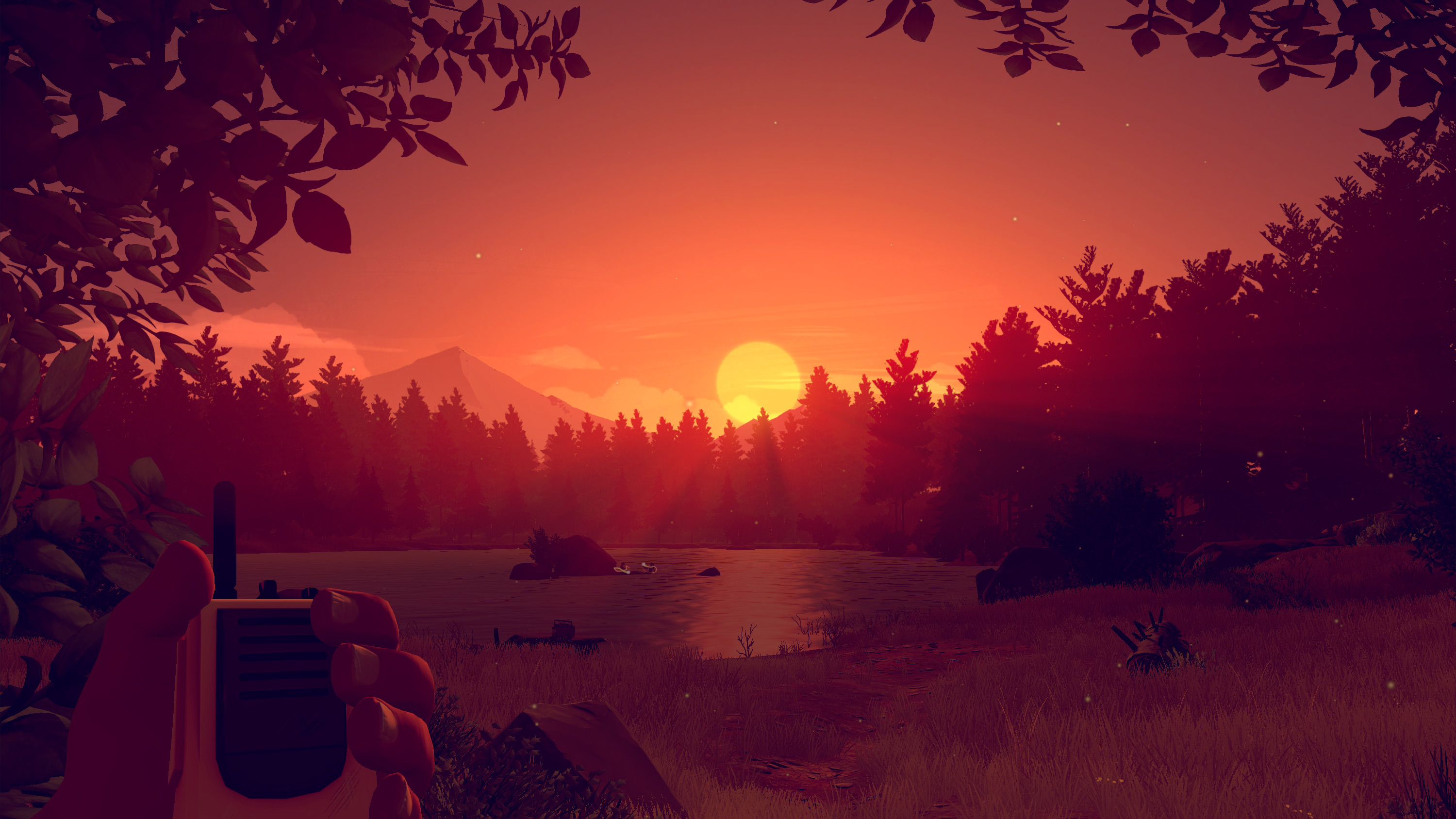Firewatch is notable for its ambition over anything else. It’s technically in the same genre as other recent “walking simulators” like Gone Home and The Vanishing of Ethan Carter, but here the player engages more directly with the narrative, or narratives, as it turns out. The game begins by setting up your character’s tragic backstory in a way that I’ve never seen done in a 3D title, incorporates a growing relationship between two characters into almost all of the game’s interactions, hints at a conspiracy thriller plotline, and tells another personal tale of tragedy along the way. That all of these narratives fail to come together in a significant way is perhaps understandable, then, but I was still hoping that the separate threads would feel more complete than they ultimately do.
I’ll try to stay away from overt spoilers in this review, but let’s begin with lead-character Henry’s personal backstory. The slightly-interactive opening is beautiful in its minimalism, and borrows heavily from narratives like Pixar’s Up. The goal is clearly to give the player-character baggage that informs his actions in the otherwise-disconnected main narrative. However, unlike Up, Firewatch fails to really provide an arc for its characters. He takes his job as a fire lookout at a national park as a reprieve from his crumbling marriage, and by the end of the title, that’s all it ever is. He doesn’t come to terms with anything, he doesn’t make any major decisions, he just gets wrapped up in a separate plotline with his boss, Delilah.
One of the game’s smartest moves is in never showing Delilah to the player. She is a voice on the radio that represents another flawed human being who happens to be in the same situation you are. Without her, Firewatch would be a very lonely experience, as you traverse its natural environment and further the plot. But Delilah, whose insights and wisecracks are only a button press away, makes the title feel like a shared experience. The few moments in which she goes radio silent lend the game a very different feeling. However, like Henry’s backstory, the relationship with Delilah seems stunted. It continually grows for roughly 2/3 of the game, and then stalls out after a particular plot twist. While the growing disconnect is likely intentional, it never serves any greater purpose.
The other major plotline, regarding the invasion of Henry and Delilah’s privacy by a third party, twists from one type of story to a completely separate one. Some players seem put off by this twist, but despite some leaps in story logic, I kind of like it. It puts the player in the head-space of a stir-crazy loner, somebody whose disconnection from the real world is causing them to see patterns where there are none and to question their own sanity. But the story that ultimately comes out of it suffers from a problem as well: while Henry and Delilah’s arcs never feel finished, this one, which serves as the climax of the game, never truly gets a beginning. That’s not to say that there’s no set-up at all; the characters who are integral to the ending are referenced occasionally in the narrative before. But we’re never really given much of a sense of who they are, nor are we emotionally engaged with them, so when the game puts all of its eggs in this one basket, it’s hard to full connect.
Regardless of its story flaws, Firewatch is a gorgeous effort made even more impressive by its small team size and the lack of a formal publisher. Despite its real-world setting, the whole game is blanketed in a gorgeous painterly aesthetic, with warm hues beading down on Henry and the natural landscapes. Exploring the landscape is rewarding in its own right, and the various elements of traversal (rappelling/rope climbing, chopping down trees to create passage, inserting spikes into rock cracks) make the game feel more interactive than other “walking simulator” titles.
Firewatch’s lack of narrative cohesion, resolution, and catharsis is unfortunate, because with just a few script tweaks this could have been a resounding success. But still, Firewatch deserves attention for its ambition. This is a game by a team that truly wants to stretch the gaming medium’s capacity for storytelling, and they take several risks that other, larger developers would shy away from. The fact that Firewatch even contains multiple character threads to assess is a step up from many games, and a reason to give it a shot.

The game kind of reminds me of Soma, with existential dread replaced by gorgeous vistas.
Both games seem far more preoccupied with making you think than forcing you to come to a conclusion. As someone who personally loves the moralizing tale with a strong, heavy-handed Picard speech at the end to really drive the point home, I really appreciate the kinds of stories games like these are able to tell while using the medium. I would hardly consider watching movie versions of either a Soma or Firewatch based story.
*it should probably say “EVEN as someone who personally loves…”
So, I played SOMA (and finished Amnesia) this week. Really liked SOMA. I see what you’re saying with the comparison, especially the way that you’re bonding with a disembodied voice. I preferred SOMA’s story, though. It plays off of a great hard sci-fi concept that I’ve considered writing about myself, and the story feels complete in a way that Firewatch did not.
I did get a kick out of how Simon didn’t understand what happened in the end, though. That guy is pretty thick.
I tend to really like ambiguous or open-ended storytelling too, but I prefer it when it fits with the material. In Firewatch’s case, it felt more like a set of incomplete narratives than an intentional appeal to ambiguity, so it didn’t quite work for me. I still need to play SOMA, though!